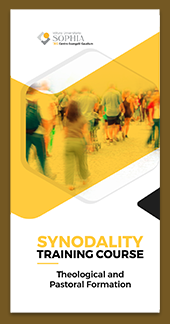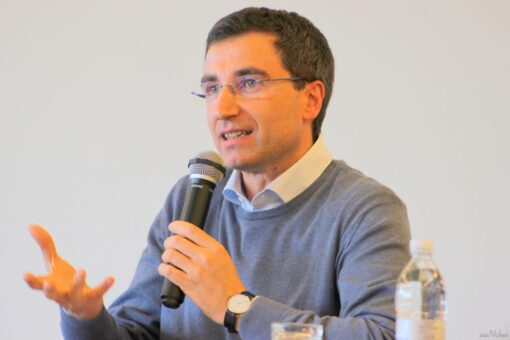
Course on Synodality: part of a single people
The Evangelii Gaudium Centre (CEG) has opened the inscriptions for the Training Course for Synodality, a concrete contribution to respond to the Church’s call to walk together. The Evangelii Gaudium Centre (CEG) which is linked to the Sophia University Institute, is offering a Synodal Training Course which will begin in 2023. It is a course which has been developed in collaboration with the General Secretariat of the Synod and with other training centres and academic institutes in Italy and beyond. But why talk about synodality? Prof. Vincenzo di Pilato, Professor of Fundamental Theology at the Pugliese Theological Faculty in Italy and coordinator of the CEG, explains:

Prof. Vincenzo di Pilato
 The course will take place over three years. There will be 4 sessions each year (3 academic modules and a residential meeting). They will deal with issues linked to the ongoing synodal process. You can sign up for the whole year or for a single module. The official language will be Italian, but there will be simultaneous translations into Spanish, Portuguese and English. It is a course for all members of the People of God, from bishops to pastoral workers, from priests to nuns, from seminarians to lay people. For this year, we will keep the course online. Where possible, we recommend participating in groups from the same community, parish or diocese so as to make the course a real “gym of synodality”. Two or more participants, who will be able to dialogue with each other in a synodal style, will become “multipliers” of the course, or of its main themes, in the community to which they belong. During a meeting with the various ecclesial realities linked to the Focolare Movement, the Co-President, Jesús Morán, spoke about the spirituality of communion (citing the Novo Millennium Ineunte of Saint John Paul II) and synodality as two distinct moments which are however linked to each other,. Can you elaborate on this concept? We are preparing for the next Jubilee in 2025, with a prolonged synodal journey unprecedented in the history of the Church. In the aftermath of the last Jubilee of the Year 2000, St. John Paul II recognized that “much has been done since the Second Vatican Council, also with regard to the reform of the Roman Curia, the organization of Synods, and the functioning of Episcopal Conferences. But certainly much remains to be done” (NMI, 44). What did he mean by that “much remains to be done”? I think it was not a rhetorical expression for him, but a prophetic one. In 2015, the fiftieth anniversary of the institution of the Synod of Bishops, Pope Francis said: “The path of synodality is the path that God expects from the Church of the third millennium”. This is the mutual convergence between these two Jubilees: on one hand, the “spirituality” of communion which allows us to penetrate into the highest contemplation of the mystery of God the Trinity, preserved within and among all creatures; on the other hand, synodality as a “path” on which to remain, following the example of Jesus and Mary, mingled together, participating “in this somewhat chaotic tide that can be transformed into a true experience of fraternity, into a caravan of solidarity, into a holy pilgrimage” (Evangelii Gaudium 87). It is clear, therefore, that there is no spirituality of communion without synodality and vice versa. Communion which leads to unity is the mystery of God revealed to us by Jesus Crucified-Risen and forever present in the destiny of humanity; synodality is the way that allows us to make it visible “so that the world may believe” (Jn. 17: 21). What does all this mean concretely for each of us and what are the steps to live this call? First of all we should feel that we are part of a single people, not a group of individuals standing next to each other like pins in a bowling alley or passengers in a lift. Addressing young people, Pope Francis explained it this way: “When we speak of ‘people’ we must not think of the structures of society or of the Church, but rather the group of people who do not walk as individuals, but as the fabric of a community of all and for all, who cannot allow the poorest and the weakest to be left behind: ‘The people want everyone to share in the common good and for this reason they are ready to adapt to the pace of the last one in order to arrive all together’” (Christus Vivit, 23). Here we are: walking together without leaving anyone behind, recognizing the presence of Christ in everyone who passes by us. This is the root of the equal dignity and freedom of each of us. Feeling one people is the premise, but also the purpose of synodality, just as Jesus is, at the same time, the Way and our travelling companion. The Holy Spirit dwells in every member of God’s people, as in a temple, and the only law among all must be the new commandment, to love as Jesus himself loved us (cf. Jn. 13: 34). We hope that the Course will be a stretch of road embarked on together, with our eyes fixed on the horizon of the Kingdom of God, which we meet whenever there is a neighbour to love.
The course will take place over three years. There will be 4 sessions each year (3 academic modules and a residential meeting). They will deal with issues linked to the ongoing synodal process. You can sign up for the whole year or for a single module. The official language will be Italian, but there will be simultaneous translations into Spanish, Portuguese and English. It is a course for all members of the People of God, from bishops to pastoral workers, from priests to nuns, from seminarians to lay people. For this year, we will keep the course online. Where possible, we recommend participating in groups from the same community, parish or diocese so as to make the course a real “gym of synodality”. Two or more participants, who will be able to dialogue with each other in a synodal style, will become “multipliers” of the course, or of its main themes, in the community to which they belong. During a meeting with the various ecclesial realities linked to the Focolare Movement, the Co-President, Jesús Morán, spoke about the spirituality of communion (citing the Novo Millennium Ineunte of Saint John Paul II) and synodality as two distinct moments which are however linked to each other,. Can you elaborate on this concept? We are preparing for the next Jubilee in 2025, with a prolonged synodal journey unprecedented in the history of the Church. In the aftermath of the last Jubilee of the Year 2000, St. John Paul II recognized that “much has been done since the Second Vatican Council, also with regard to the reform of the Roman Curia, the organization of Synods, and the functioning of Episcopal Conferences. But certainly much remains to be done” (NMI, 44). What did he mean by that “much remains to be done”? I think it was not a rhetorical expression for him, but a prophetic one. In 2015, the fiftieth anniversary of the institution of the Synod of Bishops, Pope Francis said: “The path of synodality is the path that God expects from the Church of the third millennium”. This is the mutual convergence between these two Jubilees: on one hand, the “spirituality” of communion which allows us to penetrate into the highest contemplation of the mystery of God the Trinity, preserved within and among all creatures; on the other hand, synodality as a “path” on which to remain, following the example of Jesus and Mary, mingled together, participating “in this somewhat chaotic tide that can be transformed into a true experience of fraternity, into a caravan of solidarity, into a holy pilgrimage” (Evangelii Gaudium 87). It is clear, therefore, that there is no spirituality of communion without synodality and vice versa. Communion which leads to unity is the mystery of God revealed to us by Jesus Crucified-Risen and forever present in the destiny of humanity; synodality is the way that allows us to make it visible “so that the world may believe” (Jn. 17: 21). What does all this mean concretely for each of us and what are the steps to live this call? First of all we should feel that we are part of a single people, not a group of individuals standing next to each other like pins in a bowling alley or passengers in a lift. Addressing young people, Pope Francis explained it this way: “When we speak of ‘people’ we must not think of the structures of society or of the Church, but rather the group of people who do not walk as individuals, but as the fabric of a community of all and for all, who cannot allow the poorest and the weakest to be left behind: ‘The people want everyone to share in the common good and for this reason they are ready to adapt to the pace of the last one in order to arrive all together’” (Christus Vivit, 23). Here we are: walking together without leaving anyone behind, recognizing the presence of Christ in everyone who passes by us. This is the root of the equal dignity and freedom of each of us. Feeling one people is the premise, but also the purpose of synodality, just as Jesus is, at the same time, the Way and our travelling companion. The Holy Spirit dwells in every member of God’s people, as in a temple, and the only law among all must be the new commandment, to love as Jesus himself loved us (cf. Jn. 13: 34). We hope that the Course will be a stretch of road embarked on together, with our eyes fixed on the horizon of the Kingdom of God, which we meet whenever there is a neighbour to love.
Maria Grazia Berretta
